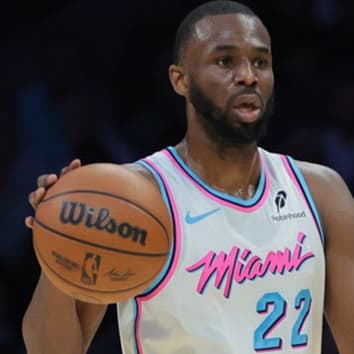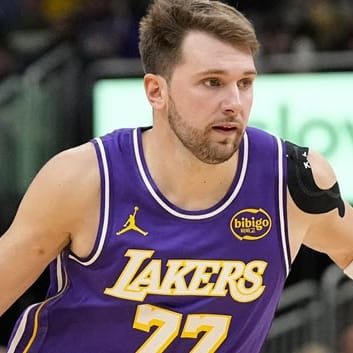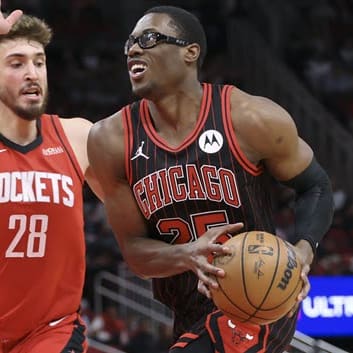Can we all stop sniping James Harden?
When Harden was traded to the Rockets late Saturday night, the very active Twitter volcano immediately erupted. Commentary spanned from classy "good luck" wishes to irrational accusations of backstabbing. And frankly, it's outlandishly unfair, mainly because criticisms that label Harden as "greedy" or "selfish" or "uncommitted to winning" are either totally erroneous or factually inaccurate.
The leading, circulating fallacy about this trade is that Harden turned down a difference of "only" $4.5 million over four years (the Thunder reportedly offered him $55.5 million over four years, $4.5 million below the max). But sorry, that's wrong and here's why.
While the Thunder did choose Kevin Martin's aversion to defense, Jeremy Lamb, and picks-a-plenty over paying Harden $4.5 million more over the next four years, the reverse does not hold true. Harden couldn't sign for a fifth year with the Thunder, but will be able to do so with the Rockets, greatening the difference between the Thunder's offer and a potential Rockets' contract to tens of millions of dollars. So let's not pretend the Thunder was financially close in this deal. Athletes almost always will – and almost always should – take the extra years.
The most egregious Harden complaint though might be the "uncommitted to winning" one. I don't know James Harden nor do I pretend to. (Though we do have the exact same birthday and may have the ability to speak telepathically.) But the fact that Harden wants to be
Can we all stop sniping James Harden?
When Harden was traded to the Rockets late Saturday night, the very active Twitter volcano immediately erupted. Commentary spanned from classy "good luck" wishes to irrational accusations of backstabbing. And frankly, it's outlandishly unfair, mainly because criticisms that label Harden as "greedy" or "selfish" or "uncommitted to winning" are either totally erroneous or factually inaccurate.
The leading, circulating fallacy about this trade is that Harden turned down a difference of "only" $4.5 million over four years (the Thunder reportedly offered him $55.5 million over four years, $4.5 million below the max). But sorry, that's wrong and here's why.
While the Thunder did choose Kevin Martin's aversion to defense, Jeremy Lamb, and picks-a-plenty over paying Harden $4.5 million more over the next four years, the reverse does not hold true. Harden couldn't sign for a fifth year with the Thunder, but will be able to do so with the Rockets, greatening the difference between the Thunder's offer and a potential Rockets' contract to tens of millions of dollars. So let's not pretend the Thunder was financially close in this deal. Athletes almost always will – and almost always should – take the extra years.
The most egregious Harden complaint though might be the "uncommitted to winning" one. I don't know James Harden nor do I pretend to. (Though we do have the exact same birthday and may have the ability to speak telepathically.) But the fact that Harden wants to be paid what he believes he is worth on the open market does not make him selfish and it surely does not make him apathetic when it comes to his team's success.
The idea that wanting to max out financially is mutually exclusive with caring about winning is mainly closed-minded. It almost seems like media and fans in 2012 are born with some sort of gene that forces them to attack players regardless of reason or logic. There is a distinct possibility that by 2019, biologists will announce the discovery of "the Troll Gene", located right in the middle of the X chromosome. It could be jealousy: jealousy of fame, jealousy of talent, jealousy of money. I really don't know. But for some reason, we're hiding out in the Twitter and Facebook trenches firing blind shots at those who don't deserve it.
Sorry public, but you can't spend two years tearing LeBron apart to a skeletonian degree (yep, just made up "skeletonian", but let's see if we can get it into Webster), crying hatred and betrayal, claiming that he is a sellout, and then denounce Harden for presumably doing the exact opposite. In neither case is such criticism warranted.
The two situations aren't opposites – there is middle ground in both scenarios – but the media and fans have painted the polarization to look like an elephant vs. a donkey. If you're going to Twitter-kill LeBron for taking less money so that he can put himself in a better situation to win (or as it's more commonly known with "the haters", chasing rings), then you absolutely can't condemn Harden for seemingly giving up a great situation to win so that he can make more money. Neither situation is wrong. Neither situation is right. Both situations were right for the respective individuals and it's unfortunate that people continue to burn jerseys and fire shots at a man whose only crime was trying to negotiate his contract.
_______________________________________________________________________________________________
Even though it seems like it, James Harden and Kevin Martin weren't the only players involved in this trade. Here is a quick evaluation of the younger guys who switched sides and what their new roles might look like:
Lazar Hayward, acquired by the Rockets: So many forwards; such little time. What to do? What to do? It's hard to imagine a 6-foot-6, soon-to-be-26-year-old forward getting any sort of significant playing time on a team that is hoarding threes and fours. If Hayward wants to get into a game, he's probably going to have to poison some mix of Jon Brockman, Carlos Delfino, Gary Forbes, JaJuan Johnson, Terrence Jones, Marcus Morris, Donatas Motiejunas, Chandler Parsons, Patrick Patterson, or Royce White. And if this actually happens, you can't say I encouraged such inappropriately shrewd behavior.
Cole Aldrich acquired by the Rockets: Aldrich actually had a strong preseason. The former Jayhawk shot swatter averaged 1.7 blocks per game and 7.0 rebounds per game in his 23.7 minutes per night. Omar Asik is the only other true center on the Houston roster and that means Aldrich may actually have a shot at sticking around and playing at the backup five spot for the Rockets. Be wary of those preseason numbers though. Last year, Aldrich had four blocks and 11 rebounds in 29 preseason minutes and went on to average 6.7 minutes per game in the regular season.
Jeremy Lamb, acquired by the Thunder: Lamb is part of the long-term logic that Oklahoma City used in trading Harden. The rookie from Connecticut was a lottery pick this past summer, but is still super skinny and is probably a couple years away from having any sort of major impact. He averaged 6.2 points per game (14th among rookies) in 16.4 minutes per contest in the preseason and has shot the ball well, but being stuck behind guards Russell Westbrook, Thabo Sefolosha, Eric Maynor, Kevin Martin, and Reggie Jackson doesn't bode well for his potential playing time.


































